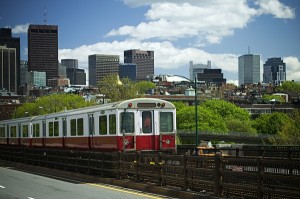 BOSTON (AP) — MBTA officials plan to outline a more than $2 billion annual operating budget they hope will begin the process of eliminating chronic deficits on the Boston-area transit system and speed up the replacement of aging equipment.
BOSTON (AP) — MBTA officials plan to outline a more than $2 billion annual operating budget they hope will begin the process of eliminating chronic deficits on the Boston-area transit system and speed up the replacement of aging equipment.
The preliminary spending plan for the fiscal year starting July 1 will be submitted on Wednesday to the management control board that was created last year to oversee theMassachusetts Bay Transportation Authority after winter storms crippled the system and exposed deep-seeded financial problems at the nation’s fifth-largest transit system.
The budget includes a $43 million fare hike that was approved by the board last week over the objections of raucous protesters. It also assumes legislative approval of $187 million in state subsidies for the T, the same amount the system is receiving from the state this year.
The additional funds from the fare hike and a portion of the state money would be used to address dire maintenance needs, including replacement of signal relays on the Green Line that date to 1915, officials said.
“The key here is that through a combination of fare increases and additional state assistance, we are putting $100 million into capital, which is something that has not happened in the past,” said Brian Shortsleeve, the MBTA’s chief administrator.
The agency has an estimated $7.3 billion “state of good repair” backlog, as it’s called, and officials have said it will take at least 25 years to address it. In addition to presenting the budget on Wednesday, Shortsleeve said he would also present a plan to begin addressing that deferred maintenance more aggressively over the next five years.
The MBTA is trying to erase a structural deficit that has been caused by expenses outstripping revenues, forcing the state to essentially bail out the system with annual subsidies. For the fiscal year starting July 1, officials are projecting revenues to increase 5 percent while operating expenses would only rise 4 percent.
The anticipated savings include a $12 million drop in overtime and a $15 million reduction in wages — the latter by offering retirement incentives to older, administrative employees.
Rising pension costs remain a serious concern, however, with the budget projecting a nearly $14 million, or 17 percent, increase due in part to a lower return on investments by the pension fund.

























Speak Your Mind